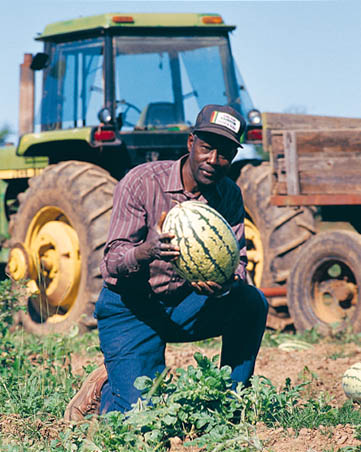Reaching Out To Small Farmers—USDA Funds Programs At Tuskegee and Alabama A&M

At age 69, Autauga County farmer Willie Brown still can outwork men half his age. As he picked watermelons and tossed them to employee Eric Parker, however, he admitted he might have quit farming long ago had it not been for Tuskegee University’s Small Farmer Outreach Training and Technical Assistance Program.”I’ll tell you like it is. If it hadn’t been for the folks at Tuskegee, there would be a lot of us farmers who would be gone,” Brown said.Miles Robinson, who manages the small farmer outreach program, said his team of four specialists has been working with farmers like Brown since 1993. During that time, the program has helped more than 300 families in two dozen counties improve their farm operations.”Our goal is to sustain the growth and profitability of small farms and to assist them in making farming a viable option for supporting their families,” Robinson said.The outreach program is funded through the U.S. Department of Agriculture, which recently announced grants for Tuskegee University and Alabama A&M University totaling $553,644. Robinson credits the Alabama Farmers Federation, the State Department of Agriculture and Industries and Alabama’s congressional delegation for helping to secure the funding, adding that support from other agencies is a key to the program’s success.”We try to forge partnerships with groups like Alfa, the Department of Agriculture and USDA that can rally around these farmers and keep them moving in the right direction,” Robinson said. In addition, he said the outreach program provides small farmers access to the latest agricultural research by putting them in contact with university scientists and extension personnel.Brown, for instance, said he has improved his beef herd by working with animal scientists from Tuskegee, and his brother, Odell, said he has benefited from advice about drip irrigation and plastic mulch. Perhaps the most beneficial guidance provided by the small farmer outreach, however, was the assistance it provided in establishing the Browntown Small Farmer Cooperative.Robinson explained that, for years, Willie Brown–nicknamed Pip–provided leadership in the Autauga County farming community by helping his relatives and neighbors arrange marketing with grocery store chains, brokers and produce wholesalers. In fact, Brown, who produced 300 acres of watermelons this year, often negotiated sales for as many as 60 semi-truckloads of watermelons. But until recently, the farmers in Browntown had not extended their cooperative efforts beyond the marketing of their produce. With the establishment of the Browntown Cooperative, however, Odell Brown said he hopes the farmers will work together to purchase much-needed equipment.”We had been trying to get a cooperative started for about six years before Miles got involved,” Odell recalled. “Now that we have the cooperative, we can go together and buy equipment like a sprayer to help keep diseases out of our crops. Something like that would be too expensive for one person to buy. But if we buy it through the cooperative, we can all use it.”Willie Brown is president of the Browntown Cooperative, which now includes about 50 members. Brown’s leadership in the farming community, however, is not limited to the cooperative. This year he was named Tuskegee’s Merit Farmer of the Year at the university’s 109th Annual Farmers’ Conference, and Robinson said he often is called on to represent African American farmers at conferences and hearings throughout the country.”Mr. Brown is a full-time farmer, and that makes him somewhat unique in that all his income is derived from farming,” Robinson said. Brown’s operation also is worthy of distinction because his children all worked with him at some point in their lives, and now several of his grandchildren help out on the farm, Robinson added.Today, Brown produces a variety of vegetables including watermelons, peas, sweet corn, cantaloupes, squash, pole beans and okra. He also raises hogs and beef cattle. But none of that would be possible, he said, without the outreach program’s assistance in arranging financing.”When we get stalled (with a loan application), they can come in and show the bank that we are capable of doing what we say we’ll do,” Brown said.Robinson said being able to provide that type of reference is one of the most rewarding parts of his job. In addition, he said the outreach program works with farmers like Brown to improve their management techniques and bookkeeping skills so they are better able to document their needs, assets and repayment ability when dealing with lenders.He is quick to point out that the work of the outreach program does not end when a farmer obtains a farm ownership or operating loan. His specialists also work with rural families to improve their housing, enhance community facilities and obtain funding for youth agricultural projects.One of Tuskegee’s small farmer outreach specialists is Brown’s daughter, Audrey Zeigler. She said growing up on her father’s farm gives her a greater appreciation for the unique challenges that small farmers face.”Down through the years, I’ve seen the struggles he went through financially, and I could see the needs of farmers,” Zeigler said. “When I go into a bank and help a farmer get a loan that will assist him in generating income for his family, it makes me feel great. It does me a lot of good knowing that I am able to help other farmers like him.”EDITOR’S NOTE: For more information, contact Miles Robinson at the Small Farm Rural Economic Development Center, Tuskegee University, (800) 720-8698.
